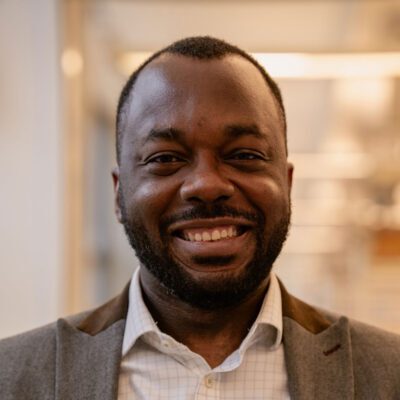The Arnold and Mabel Beckman Foundation awarded UW Bioengineering and Mechanical Engineering Assistant Professor Ayokunle (Ayo) Olanrewaju with the Beckman Young Investigator Award.
The Beckman Young Investigator (BYI) Program offers research funding to highly promising early-career faculty in the chemical and life sciences. The program aims to encourage the development of innovative methods, instruments and materials that will create new opportunities for scientific research.
One of just 10 awardees (less than 5% of applicants) to receive the 2024 award, Olanrewaju will be developing a wearable device that can collect a small amount of blood and analyze it to understand how medicines affect individual bodies. The device will allow clinicians to move away from the conventional one-size-fits-all approach to medication dosing and offer personalized medicine with precise dosages for each person.
My hope is that by inventing a test that people can use wherever they are, we can move towards a more personalized care model where the information required for people and their healthcare providers to adjust treatment protocols is available without having to go into a clinic. – Ayokunle Olanrewaju

The proposed work will advance the burgeoning field of decentralized blood collection where samples are currently shipped from people’s homes to centralized labs for testing. By integrating a microfluidic device with the blood collection system people will be able to get test results at home or in local clinics rather than sending samples to a lab.
“My hope is that by inventing a test that people can use wherever they are, we can move towards a more personalized care model where the information required for people and their healthcare providers to adjust treatment protocols is available without having to go into a clinic.” Olanrewaju said.
Because it is small and user friendly, the microfluidic device can be used in remote areas, enhancing healthcare accessibility. This innovative approach has the potential to significantly impact medical treatment, particularly for conditions requiring regular medication monitoring, such as preventing organ transplant rejection and minimizing the side effects of cancer chemotherapies.
Olanrewaju’s research is dedicated to developing technologies to improve treatment of infectious and chronic diseases including HIV, tuberculosis and cancer. These technologies are designed for point-of-care use in doctor’s offices, patients’ homes or field sites to monitor and enhance drug therapies, detect infections and advance precision medicine.
His lab utilizes 3D microfabrication, autonomous microfluidics and molecular assays to address medical challenges. They focus on continuous monitoring of medication levels to assist patients in adhering to dosing schedules, preventing treatment failure and improving health outcomes.
Recognized as a top 1,000 inspiring black scientist by Cell Mentor, Ayo has also been honored with the International AIDS Society (IAS)/ANRS Lange/van Tongeren Prize for Young Investigators, the UW/Fred Hutch Center for AIDS Research New Investigator Award and was selected in the inaugural class of Black Trailblazers in Engineering Fellows.



